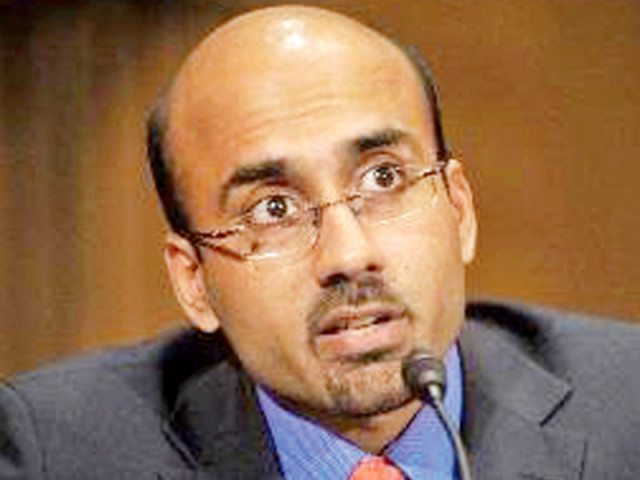Reshaping thinking: IMF names Pakistani among most influential economists
Washington-based lender names 39-year-old Atif Mian, professor at Princeton University, among 25 economists under 45.

Reshaping thinking: IMF names Pakistani among most influential economists
The International Monetary Fund (IMF) has named a Pakistani-American as one of 25 young economists who are expected to be most influential in the decades to come.
In its September edition of Finance and Development, a quarterly publication of the IMF, the Washington-based lender has named 39-year-old Atif Mian, professor of economics at Princeton University, among 25 economists under 45 “who are shaping the way we think about the global economy”.
Mian recently co-authored a book titled House of Debt, which has received critical acclaim from academia, policymakers and the general public. Nobel laureate Paul Krugman, arguably the most influential economist alive, has called Mian a leading expert on the subject of debt.
Commenting on the state of Pakistan’s economy, Mian said the foremost challenge it faces is boosting domestic productive capacity. “The low export numbers tell us that Pakistanis have trouble producing good quality products that they can then sell to the outside world (and themselves),” he told The Express Tribune.
The most important factor for long-term growth, Mian says, is the development of ‘sound institutions’ that protect an individual’s personal, contractual and property rights. Explaining that the systematic erosion of space for tolerance, plurality and peaceful coexistence is Pakistan’s core problem, Mian says the ‘rule of just law’ has been replaced by religious extremism and violence. “It is this core issue that separates Pakistan from Bangladesh and India, and restricts Pakistan’s growth potential,” he noted.
But why are militancy and extremism so dominant in Pakistan, as opposed to a country like Bangladesh that shares a common historical bond? To a large extent, the fault lies with the policies of successive Pakistani governments, starting from Zulfikar Ali Bhutto, Mian says.
“Bhutto legitimised the entry of sectarian clerics in politics by accepting the deeply flawed principle that a person’s religious belief ought to determine the extent of his or her rights as a citizen,” he said, noting that the flawed logic paved the way for sectarian politics that Ziaul Haq exploited.
In House of Debt, Mian has investigated the role of private debt – rather than the debt of the government and financial institutions – in precipitating the economic crisis of 2008. Mian and his co-author University of Chicago professor Amir Sufi argue in the book that severe economic downturns have typically been preceded by a sudden and excessive increase in household debt.
Data from the US and European economies suggest that people in the lower half of the income distribution tend to have a disproportionately higher marginal propensity to spend. Mian concludes that a shock to the wealth of subprime borrowers, like crashing home prices, results in massive cuts in their household spending. This sends the economy into a tailspin and causes foreclosures, unemployment and reduced output – a perfect recipe for an economic disaster.
Mian is one of the few public intellectuals who identify the current siege of the Pakistani state by religious extremists as a joint legacy of Bhutto and Zia. “Today’s unstable macro environment is a direct result of the Bhutto-Zia legacy, and it needs to be reversed if Pakistan is serious about growth. Doing so is not easy. But there is no other choice,” he said.
Published in The Express Tribune, September 13th, 2014.



















COMMENTS
Comments are moderated and generally will be posted if they are on-topic and not abusive.
For more information, please see our Comments FAQ